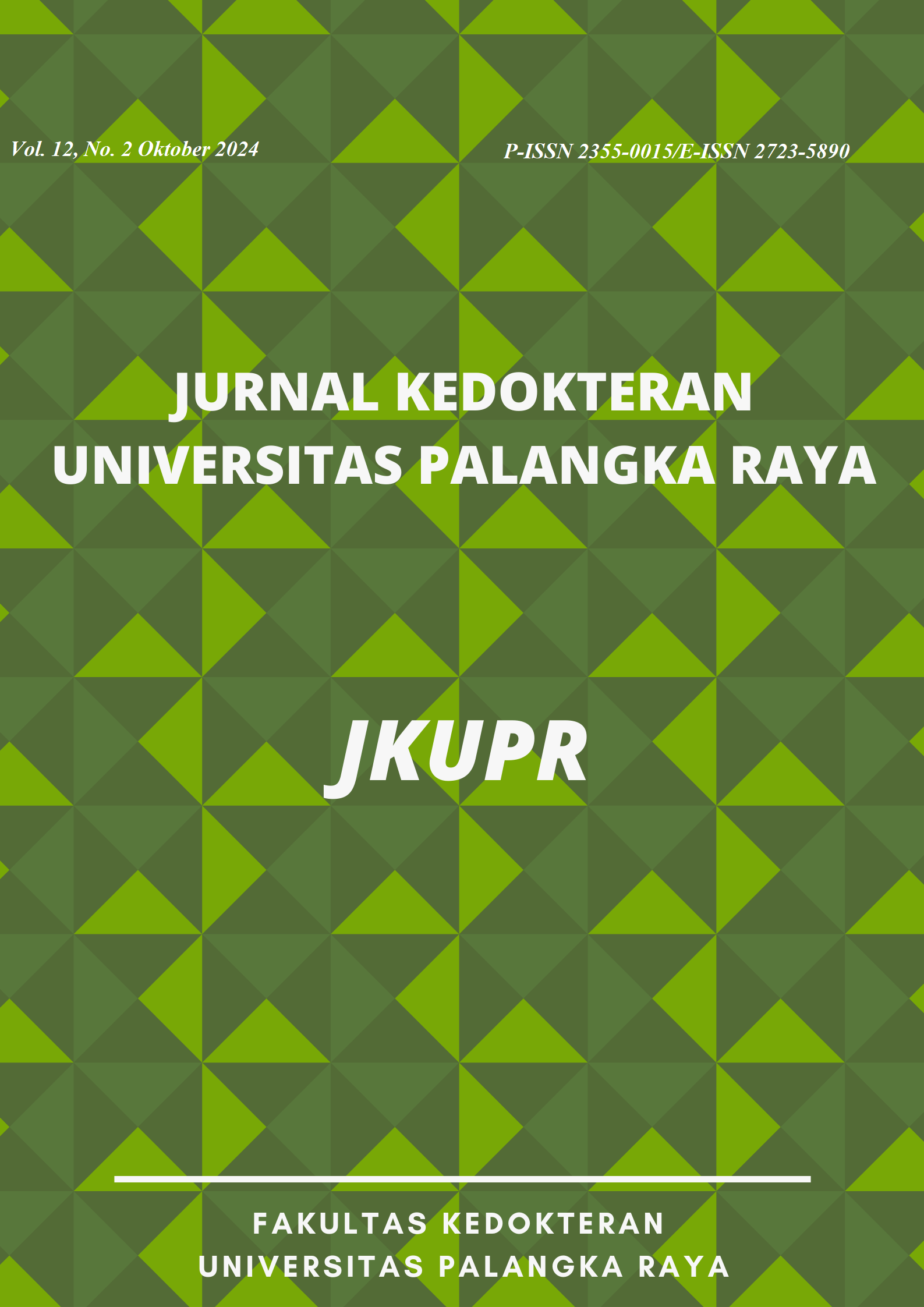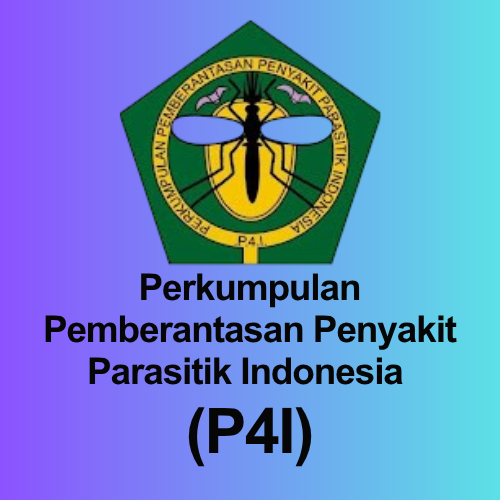Hubungan Kelelahan Dengan Kejadian Depresi Pada Mahasiswa Kedokteran Semester 7 di Universitas Palangka Raya
DOI:
https://doi.org/10.37304/jkupr.v12i2.12947Keywords:
medical student, fatigue, depressionAbstract
Fatigue can be defined as a feeling of lack of energy and difficulty in initiating or maintaining spontaneous activities. Fatigue is a growing problem among medical students. A common reason for fatigue in medical students is excessive academic workload. In recent years, fatigue has been linked to stress which can lead to depression. Therefore, this study aims to examine the relationship between fatigue and the incidence of depression in 7th semester medical students at Palangkaraya University. This research is an observational study with a cross sectional research design. which data were taken using a questionnaire from 140 respondents using purposive sampling technique. Statistical analysis using Spearman. The results of statistical analysis showed that of 140 respondents with an age range of 20 – 23 years, 82 respondents (58.57%) experienced significant fatigue. There were 93 respondents (66.43%) experiencing minimal depression, 24 respondents (17.14%) experiencing mild depression, 16 respondents (11.43%) experiencing moderate depression and 7 respondents (5%) experiencing severe depression. From the results of the hypothesis test, it was found that there was a relationship between fatigue and the incidence of depression with a value of p = 0.001. This research shows there is a statistically significant relationship between fatigue and depression.
Downloads
References
Tanaka M, Mizuno K, Fukuda S, Watanabe Y.. Personality and fatigue in medical students. Psychol Rep. 2010;106(2): 567–75. 10.2466/PR0.106.2.567-575.
Tanaka M, Mizuno K, Fukuda S, Shigihara Y, Watanabe Y.. Relationships between dietary habits and the prevalence of fatigue in medical students. Nutrition. 2008;24(10):985–9. 10.1001/jama.2009.1389.
Maciej Walkiewicz, et all. Fatigue And The Psychological Characteristics Of Medical Students. Int J Occup Med Environ Health. 2023; 36(4): 517 525. doi: 10.13075/ijomeh.1896.02116.
Chaudhuri A, Behan PO.. Fatigue in neurologicaldisorders. Lancet. 2004;363(9413):978–88. 10.1016/S0140-6736(04)15794-2.
Salehpoor G, Rezaei S, Hosseininezhad M. Quality of Life in Multiple Sclerosis (MS) and Role of Fatigue, Depression, Anxiety, and Stress: A Bicenter Study From North of Iran. Iranian J Nurs Midwifery Res (2014) 19(6):593.
Elvira DS, Hadisukanto G. Buku Ajar Psikiatri. Edisi ketiga. Jakarta: Badan Penerbit FKUI; 2017.
Lisa S. Rotenstein, BA, Marco A. Ramos, Mphil, Matthew Torre, MD et al. Prevalence of Depression, Depressive Symptoms, and Suicidal Ideation Among Medical Students. JAMA. 2016;316(21):2214-2236. doi:10.1001/jama.2016.17324
Badan Penelitian dan Pengembangan Kesehatan Kementerian Kesehatan RI. Riset Kesehatan Dasar (RISKESDAS) 2018. Jakarta: Kemenkes RI; 2018.
World Health Organization. Depression [Internet]. World Health Organization. [Internet] 2021. [Cited 2020 Mar 14]. Available from: https://www.who.int/news-room/fact-sheets/detail/depression
D. F. Santomauro et al., “Global prevalence and burden of depressive and anxiety disorders in 204 countries and territories in 2020 due to the COVID-19 pandemic,” Lancet, vol. 398, no. 10312, pp. 1700–1712, Nov. 2021. doi: 10.1016/S0140-6736(21)02143-7.
PDSKJI, “Masalah Psikologis 2 Tahun Pandemi COVID-19 di Indonesia,” Perhimpunan Dokter Spesialis Kedokteran Jiwa Indonesia, 2022. http://www.pdskji.org/home.
Tombokan, K. C., Pangemanan, D. H. C., & Engka, J. N. A. (2017). Hubungan antara stres dan pola siklus menstruasi pada mahasiswa Kepaniteraan Klinik Madya (co-assistant) di RSUP Prof. Dr. R. D. Kandou Manado. Jurnal E-Biomedik, 5(1). doi:10.35790/ebm.5. 1.2017.15978
S, Lankarani M . Stressful Life Events and Risk of Depression 25 Years Later: Race and Gender Differences. Front Public Health. 2016; 4: 49. Published online 2016 Mar 24. doi: 10.3389/fpubh.2016.00049
Vanessa Silva, et all. Depression in medical students: insights from a longitudinal study. BMC Med Education. 2017 Oct 10;17(1):184.doi: 10.1186/s12909-017-1006-0.
Manjaly ZM, Harrison NA, Critchley HD, Do CT, Stefanics G, Wenderoth N, et al. Pathophysiological and cognitive mechanisms of fatigue in multiple sclerosis. J Neurol Neurosurg Psychiatry. (2019) 90:642–51. doi: 10.1136/jnnp-2018-320050
Heitmann H, Andlauer TFM, Korn T, Mühlau M, Henningsen P, Hemmer B, et al. Fatigue, depression, and pain in multiple sclerosis: how neuroinflammation translates into dysfunctional reward processing and anhedonic symptoms. Mult Scler. (2020) 1352458520972279. doi: 10.1177/1352458520972279.
Downloads
Published
How to Cite
Issue
Section
License
Copyright (c) 2024 Jurnal Kedokteran Universitas Palangka Raya

This work is licensed under a Creative Commons Attribution-NonCommercial-ShareAlike 4.0 International License.





















